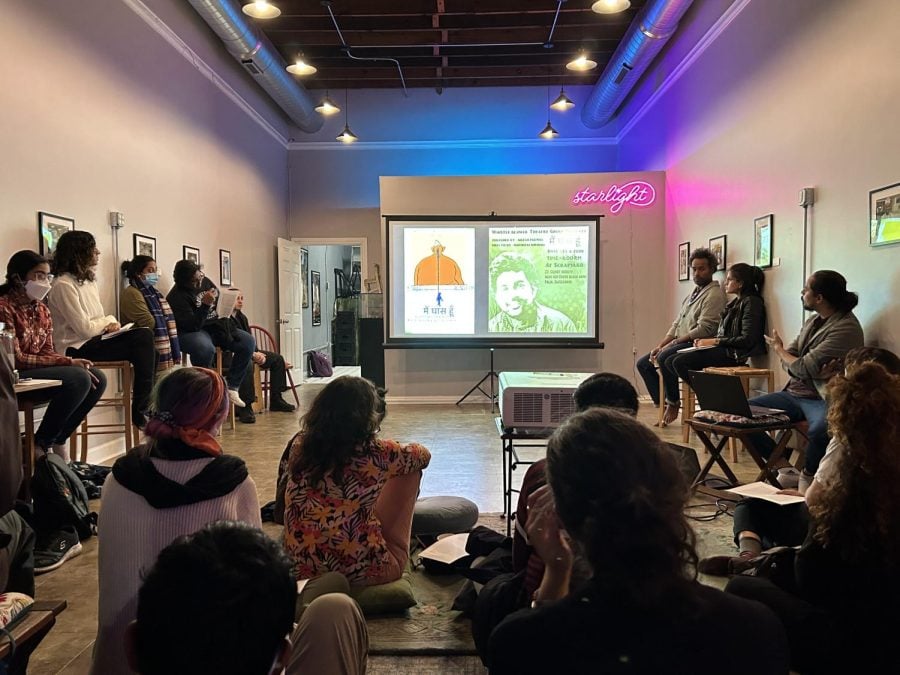SpaceShift Collective starlight space shines a light on artistic forms of resistance
Katrina Pham/Daily Senior Staffer
Community members gathered at the SpaceShift Collective space on Devon Avenue last Thursday for starlight’s “Art + Resistance” event.
October 4, 2022
Students, artists and community members lined the entryway of the “starlight” space on Devon Avenue with pink, blue and green sticky notes. Attendees wrote quick reflections about art as resistance on the notes and placed them purposely on the wall.
The activity concluded starlight’s Thursday “Art + Resistance” event, which is part of its ongoing programming hosted at the SpaceShift Collective in conjunction with the Race, Caste and Colorism project at Northwestern. The event featured an artists panel that discussed forms of anti-Black resistance through art followed by a community discussion on the panel.
Second-year Asian Languages and Cultures graduate student Soumya Shailendra, a research assistant for starlight, said the project is meant to hold the diaspora accountable for different forms of anti-Blackness in the South Asian community.
Hanging the sticky notes was a way to provide an open platform for folks to engage with art, Shailendra said.
“(We’re) giving the community the vocabulary and the tools to understand themselves in relation to caste and to also seek out moments of resistance, in which these social structures are actively resisted and survived by people in the Black community,” Shailendra said.
They said starlight centered the event on Devon because of its history as a South Asian hub of community and culture. Chicago’s Indian and Pakistani communities have opened shops, homes, restaurants and community centers on Devon Avenue, as well as Arab, Somali and Bangladeshi groups.
Third-year Asian Languages and Cultures graduate student Ishan Mehandru said since coming to Chicago from India, they have gone to Devon Avenue to find South Asian groceries, confections and other items. Coming to Devon Avenue gives Mehandru the opportunity to interact with other members of the South Asian diaspora, he said.
Mehandru was interested in the opportunity for creating a dialogue within the South Asian community in Chicago, which he said sometimes may remove itself from politics, when he heard about starlight.
“There are factions within the community along gendered lines, along religious … lines, which often (provide) interesting opportunities to sort of explore racial affinities across sort of ethnic belongings as well,” Mehandru said.
Thursday’s art and resistance event featured three artists, English Prof. and co-founder of the Race, Caste & Colorism project Ivy Wilson, Maulikraj Shrimali, founder of the Whistleblower Theater and Ayesha Riaz, an artist at SpaceShift.
Artists explored the ways different art forms can be used to disrupt systemic violence through anti-Black resistance printmaking, theater performance and architecture.
Riaz dove into the history of urban planning in Chicago. She spoke about how structures built in the city represent various power dynamics by creating visual and physical levels of control which watch over a central open-space.
Shailendra said art is deeply political, and many forms of art have “deep political investments in them.”
The space will continue to host events throughout October, including several concerts and comedy nights. Asian Languages and Cultures Prof. Laura Brueck, a co-founder of the Race, Caste and Colorism project, said she hopes the space will encourage members of the South Asian community to engage with anti-Black resistance.
“We’re really hoping that we can create a kind of atmosphere in which new ideas or new works of art emerge that wouldn’t have otherwise been possible without that sort of cross cultural conversation,” Brueck said.
Email: katrinapham2024@u.northwestern.edu
Twitter: @KatrinaPham_
Related Stories:
— Local artists explore racial justice in Noyes Cultural Art Center exhibit
— “People need art”: Northwestern alumni reflect on arts, pandemic and social justice



